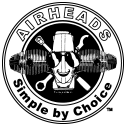'74 R75/6 exhaust valve seat issues
I have a very weird issue that happened all of a sudden while riding. My 74 R75/6 has 86k miles and while riding home from a day ride, fifteen miles from home I noticed the valve noise on the left side suddenly increased significantly and at the same time I started losing power. The old bike limped home and afterward I checked the left valve train and the exhaust clearance had opened to more than .020
I pulled the left head and on inspection, I could see a gap under the exhaust valve...initially I thought I had bent the valve, but after I pulled the valve out of the head, it was clear the valve seat had come out of the head on one side causing the valve to not seat. I was able to drive the seat back in place and after lapping and seating the valve all seems well.
I have not ever seen, nor heard of that issue before and I am stumped as to why or how the seat pooped out of position.
Any ideas?
The seats are heat shrunk into the heads and certainly the seat will come out again likely with costly consequences. There are numerous people who can replace seats with unleaded compatible seats. It is not cheap, but it is cheaper than replacing rods, pistons and then having to rebuild the head.
Bob
Thanks!
There heads haven't had any work done to them since the factory 86k miles ago...I wonder what might have caused the seat to float?
Posted by: @1872The seats are heat shrunk into the heads and certainly the seat will come out again likely with costly consequences. There are numerous people who can replace seats with unleaded compatible seats. It is not cheap, but it is cheaper than replacing rods, pistons and then having to rebuild the head.
As Bob has said, valve seat installation is a specialist job. You can't simply drive the old one back into place and expect it to stay.
Posted by: @10385There heads haven't had any work done to them since the factory 86k miles ago...I wonder what might have caused the seat to float?
Excess heat is typically the issue. Since Airheads aren't noted for any type of heat issues... especially in December... it can almost certainly only be due to poor fuel or a lean fuel condition. I would certainly investigate the following areas....
- Brand and octane rating of the fuel you use
- Pilot jet, needle jet, needle & needle position (that is 4 separate items), at standard size or richer
- Needle, needle jet, slow speed jet, or main jet closed due to a varnish coating from storage with ethanol fuel
- Incorrect float level(s) (one or both)
- Mismatched needle clip positions (as diagnosed by mismatched needle lengths)
- Torn diaphragm(s)
- Any of the above with or without incorrect ignition timing (which includes Auto Advance mechanical issues)
The temperature of combustion is set by the compression, fuel mixture and the ignition. 1974 models were already being leaned out by the EPA, and that was on the "good old gas". Now in 2021 we have fuel with 7 to 10 points lower octane, AND at least 10% ethanol added. I believe all this means a higher combustion temperature. Add in a small amount of ethanol varnish closing off the metering orifice of the jets and the problems begin. This is why I believe in enlarging the needle jet by one step and using high test fuels that scrub the carb parts clean.
Hope this helps.
Owning an old Airhead is easy.
Keeping an old Airhead running great is the true test.
This actually happened in August, just before my wife and I were hit with the china flu and even though we recovered within two or three weeks, my motivation level went to zero for a while longer.
I run non-ethanol high test with a little boostane and use 35 main jets...I tried 38s but the carbs were running too rich. I did a carb rebuild and balance at the beginning of summer.
I also use thicker base gaskets on the jugs.
► Here's the OEM jet numbers in my manual....
32mm choke Bing
135 main jet
2.70 needle jet
46-242 needle
3rd notch from top needle groove
45 idle/slow speed jet
► Apparently needle jet sizes did not go down until R75/7. Ethanol free is good, except that it won't have the cleaners.
► EI or standard points? If points have you replaced the AAU springs and how do you strobe the timing?
► Look in your Club magazine for valve seat providers.
Hope this helps.
Owning an old Airhead is easy.
Keeping an old Airhead running great is the true test.
I forgot to add the "1" to my main jet...it is 135 instead of 35.
I have a Dyna II electronic ignition and I have new springs for the advance (it goes back to idle a little slower than I like), but I haven't replaced them yet.
Thanks heaps for the very useful info.
Thoughts...
- 99% of riders are still running on the Needle/Needle Jet when they are tinkering with the Main Jet. If you'll mark your twist grip when the throttle is 90% wide open, then you'll be able to see this.
- The way the follower rides on the ignition cam will make the AAU want to return to full retard. So if your bike is slow to idle, then the AAU is worn or badly needs lubrication.
- If the AAU springs are loose, then the ignition is also advancing too fast, leading to spark knock... especially with today's poor fuel quality.
- IMHO, the whole object of EI is to allow the electronics to do everything. Therefore, the only EI's worth buying are the ones with the advance curve built into the software. That newer advance curve will more closely match the newer fuels. A mechanical advance used with ANY type ignition system can only successfully match with the fuels from 1974 because the springs and weights (that control ignition advance within the AAU) are from that period.
Owning an old Airhead is easy.
Keeping an old Airhead running great is the true test.
Please do not run your motor until the heads are re-worked. At 86K miles on a 1974 motor, it is time to do that. If an exhaust seat came loose, and your motor did not have a catastrophic event, your luck has been used up.
I have a 1973 R75/5. I was experiencing frequent valve lash adjustment. When I pulled the heads, there was almost nothing left of the exhaust seats. This is called valve seat recession, and is seen in motors that were originally designed for high octane, leaded fuel.
former Airmarshal, IL.
I had the good fortune of using a reputable "speed shop" that was local to me. There are specialized shops the cater to airhead motors. I also had the good fortune of owning an original shop manual that had all the values for the head/valve/guide/seat specifications. I used upgraded, OEM seats but let the parts guy at Bob's BMW talk me in to saving a hundred dollars by using "Black Diamond" valves. Apparently, these are not compatible OEM guides, and I suffered a bent exhaust valve at 500 miles past the first re-build. Long story short, I did the work twice. It ended up costing me twice the price. The second time I used all OEM parts. I still own the same bike and it now has several thousand miles on it after the second re-build. I will be riding it to the MOA rally in Springfield Missouri in June. I hope I make it there and back.
former Airmarshal, IL.
Posted by: @10385Any recommendations on someone to do the work?
I highly recommend Randy Long in Honey Brook, PA. He is well know in the airhead community. I have had three sets of heads done by Randy and couldn't be more pleased. 610-286-5870
SC Airmarshal Jim Zellmer did mine. Jim@ka0vsl.com. He bought Oak's tooling and got training from him.
Bob
- 27 Forums
- 1,900 Topics
- 10.8 K Posts
- 4 Online
- 5,936 Members




